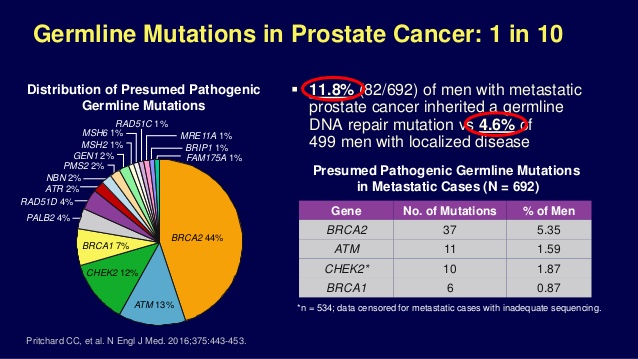Prostate matters is a not for profit organisation committed to providing free information about prostate issues from leading Clinical Authorities.
Genetics and prostate cancer

Genetics Counsellor
University Hospitals Leicester NHS Trust

Prostate cancer is the most common cancer among men in the UK, with 13% of men being diagnosed as some point in their lives. While the majority of all prostate cancer occur by chance, it is estimated that 5-9% of all prostate cancers, and about 12% of metastatic* prostate cancers, are hereditary. In general, men who have a father, brother or son (first degree relative) with prostate cancer, are at twice the risk of developing prostate cancer, while men with two first degree relatives have 5 times the risk compared to the general population.
* “Cancer that is not confined to the prostate gland but has spread to other parts of the body”
Typically, prostate cancer is very slow growing and left undiagnosed or untreated would not shorten a man’s life; this type of prostate cancer is seen very commonly in older men. However, in some men prostate cancer can be aggressive and develop more quickly: in these situations early diagnosis and treatment is important. Regularly screening, for example with PSA can help identify these men at earlier stages.
Men may have an increased risk of prostate cancer, and genetic testing may be helpful, if they have the following signs in their families:
- Relatives with early onset prostate cancer (diagnosed before age 55)
- 3 first degree relatives (brother, son, father) diagnosed with prostate cancer
- Ashkenazi Jewish ancestry and breast, ovarian or prostate cancer
- Prostate cancer and two relatives with breast or ovarian cancer
- Prostate cancer and male breast cancer, or ovarian cancer or bilateral breast cancer
- Prostate cancer and early onset bowel or womb cancer (before age 50)
- Prostate cancer and 2 relatives with bowel or womb cancer
Genetic testing can look for changes (mutations) in several different genes which are known to cause an increased risk of prostate cancer. Mutations in the BRCA1 and BRCA2, HOXB13, ATM, CHEK2 and Lynch Syndrome genes are associated with higher risk of prostate cancer and are inherited in an autosomal dominant pattern which means one copy of the altered gene in each cell is sufficient to increase a person’s chance of developing cancer. In other words, if a parent has a mutation in one of these genes their children have a 50% risk of inheriting the genetic mutation and therefore being at increased risk of prostate cancer. Genetic mutations for prostate cancer can be inherited from both the mother and the father’s side of the family.
The table below summarises the risk of prostate cancer associated with known genes:
|
Mutated Gene |
Increased lifetime risk of Prostate cancer |
|
BRCA1 |
7 – 25% |
|
BRCA2 |
19 – 60% |
|
HOXB13 |
33 – 60% |
|
Lynch Syndrome |
12-52% |
|
ATM and CHEK2 |
Moderate risk |
For men who have been diagnosed with prostate cancer, genetic testing may be helpful as it may alter their treatment, particularly for those men with BRCA1/BRCA2 mutations who may benefit from platinum-based therapy while men with Lynch syndrome may find Pembrolizumab beneficial. It should be noted that while it is expected that there are approximately 31,000 men in the UK with BRCA1 and BRCA2 mutations, currently very few have been identified. There are current studies underway such as the IMPACT study which is further investigating prostate cancer genes, and the best way to screen for prostate cancer.
The link below will take you to the page providing information on how to get genetic testing if you think you are at risk

Prostate matters is a not for profit organisation that is committed to providing free expert advice about prostate issues from leading Clinical Authorities
In memory of Riki
PROSTATE MATTERS
Copyright Disclaimer: We try to acknowledge copyright as appropriate. If we have used something without acknowledging copyright, this is inadvertent. Please let us know by emailing info@prostatematters.co.uk
Site design and technical development by Webtoys | Intelligent Digital Media

